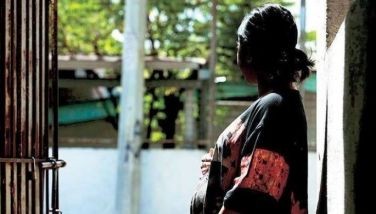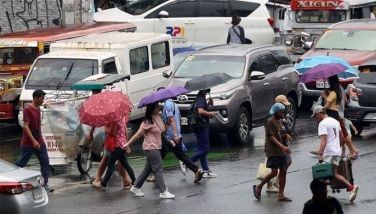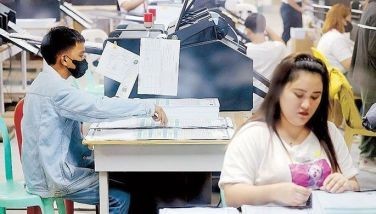Singapore OKs weekly day off for foreign domestic workers
MANILA, Philippines - Singapore’s Manpower Ministry has granted foreign domestic workers a weekly rest day as part of the reforms introduced to improve working conditions.
The New York-based Human Rights Watch said yesterday the decision is an important reform but it falls short of international standards.
The changes, announced on March 5, will go into effect only for new contracts beginning in January 2013 and do not address the exclusion of domestic workers from other key labor protections in Singapore’s Employment Act.
“The Singaporean government’s recognition of a weekly rest day as a basic labor right will make the lives of migrant domestic workers better,” said Nisha Varia, senior women’s rights researcher at Human Rights Watch. “But this important reform should go into effect this year and (must) apply to all domestic workers and their current contracts.”
The announcement by Manpower Minister Tan Chuan-Jin said employers will be able to give a domestic worker monetary compensation in lieu of a rest day with the domestic worker’s permission.
Human Rights Watch said that given the imbalance of power between employers and domestic workers, there is significant risk of abuse that employers may coerce workers to sign away their day of rest.
Families in Singapore employ approximately 206,000 foreign domestic workers, primarily from Indonesia, the Philippines, Sri Lanka, and India.
Many of these domestic workers serve long hours, seven days a week and would often turn over several months’ of pay to settle charges imposed by employment agencies and face restrictions on leaving the workplace even during their day off.
“As Manpower Minister Tan noted in his speech to parliament, a day off is critical for a domestic worker’s physical, mental, and emotional well-being,” Varia said. “The government should close the monetary loophole and ensure that domestic workers will actually get at least a minimum number of rest days.”
Singapore has introduced reforms in recent years to improve the conditions of foreign domestic workers, including mandatory orientation programs and stronger regulation of employment agencies.
The state prosecutors have also been increasingly vigilant in prosecuting employers responsible for physically abusing domestic workers, resulting in fines and prison terms.
“However, Singapore’s labor protections still lag behind those of other migrant-receiving countries. This includes Hong Kong, which covers domestic workers in its main labor laws. Singapore’s protections also fall short of the standards set by the International Labor Organization’s (ILO) Convention No. 189 on Decent Work for Domestic Workers, adopted in June 2011,” the group noted.
The ILO Convention establishes the first global standards for the estimated 50 million to 100 million domestic workers worldwide. Key elements of the convention require governments to provide domestic workers with labor protections equivalent to those of other workers, including working hours, minimum wage coverage, overtime compensation, daily and weekly rest periods, social security, and maternity protection.
The group said Singapore was one of only nine countries that did not support adoption of the convention.
“Singapore’s reforms are only a fraction of the change needed to protect women workers, who are too often undervalued and overworked,” Varia said. “Singapore should join countries around the world that have recognized the injustice of discrimination against domestic workers and are making comprehensive reforms to guarantee them the same rights as other workers.”
Meanwhile, Philippine Ambassador to Sweden Maria Zenaida Angara Collinson lauded yesterday Vice President Jejomar Binay for his efforts in the lifting of Au Pair ban in Europe.
Collinson congratulated Binay during a courtesy call yesterday at the Office of the Vice President (OVP) in the Coconut Palace.
She said that about 1,000 Filipinos can now avail of the au pair program in Sweden and the Minister for Migration and Asylum Policy Tobias Billstrom has accepted the invitation of the Philippine government to visit the country late this year or on the first quarter of 2013.
Binay, presidential adviser on overseas Filipino workers’ (OFWs) concerns, earlier said that figures from the Commission on Filipinos Overseas (CFC) and the Overseas Workers Welfare Administration (OWWA) showed that 1,500 to 2,000 au pairs would be deployed in European countries this year.
Au pair is a French term that translates to “on par” or “equal to.” Filipinos under the au pair program “live on an equal basis in a reciprocal, caring relationship” with their host families.
“The intent is for the foreigner to be at par or equal to locals, by being treated as a member of the family instead of a domestic servant. Au pairs normally perform housework and child care. While not receiving a formal salary, they will receive monetary allowance from their host families,” Binay said.
The Philippines stopped sending au pairs to Europe in 1997 after the DFA received reports of maltreatment including unfair compensation, excessive working hours, discrimination and sexual assault.
In 2010, the ban was partially lifted in Switzerland, Norway and Denmark.
Department of Foreign Affairs (DFA) Secretary Albert del Rosario had earlier announced that improved safety nets and protection policies for Filipinos who will be hired as au pairs led to the lifting of the ban.
Binay also urged Filipinos to take advantage of the recent lifting of ban for all European countries.
“I believe the lifting of the ban on au pairs would facilitate the establishment of education and employment opportunities in Europe for Filipinos,” Binay said.
“We also simplified the procedures for the departure of au pairs and the documentary requirements have been scaled down to the minimum,” he added.
Binay said new guidelines for au pairs provides that “departing au pairs need only to submit the following to the Bureau of Immigration at the port of departure: a contract of engagement duly authenticated by the Philippine embassy or consulate general in the area of destination, valid passport with au pair visa, and a CFO certificate/sticker.”
Binay also noted that au pairs no longer need to go through DOLE or POEA procedures anymore, as they are not considered OFWs.
He also warned au pairs to avoid third-party fixers, while those unscrupulous agencies should not exploit the scheme.
“I have instructed the IACAT (Inter-Agency Council Against Trafficking) to monitor the au pair program and ensure that those who join do not become victims of trafficking syndicates or illegal recruiters,” Binay said. – With Jose Rodel Clapano
- Latest
- Trending
































